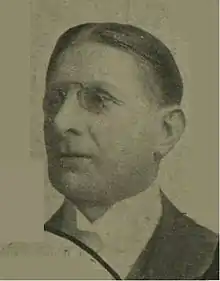| Glasgow College | |
|---|---|
| Former Burgh constituency for the House of Commons | |
| Major settlements | Glasgow |
| 1885–1918 | |
| Seats | One |
| Created from | Glasgow |
| Replaced by | Glasgow Kelvingrove |
Glasgow College was a parliamentary constituency in Glasgow. It returned one Member of Parliament (MP) to the House of Commons of the Parliament of the United Kingdom, elected by the plurality voting system.
History
The constituency was created by the Redistribution of Seats Act 1885 for the 1885 general election, and abolished for the 1918 general election.
Boundaries
The Redistribution of Seats Act 1885 provided that the constituency was to consist of the Tenth and Eleventh Municipal Wards.[1]
Members of Parliament
| Election | Member | Party | |
|---|---|---|---|
| 1885 | Charles Cameron | Liberal | |
| 1895 | Sir John Stirling-Maxwell | Conservative | |
| 1906 | Harry Watt | Liberal | |
| 1918 | constituency abolished | ||
Elections
Elections in the 1880s
| Party | Candidate | Votes | % | ±% | |
|---|---|---|---|---|---|
| Liberal | Charles Cameron | 5,662 | 57.8 | ||
| Conservative | William Montgomery-Cuninghame | 4,139 | 42.2 | ||
| Majority | 1,523 | 15.6 | |||
| Turnout | 9,801 | 82.1 | |||
| Registered electors | 11,934 | ||||
| Liberal win (new seat) | |||||
| Party | Candidate | Votes | % | ±% | |
|---|---|---|---|---|---|
| Liberal | Charles Cameron | 4,880 | 53.6 | −4.2 | |
| Liberal Unionist | Richard Vary Campbell | 4,225 | 46.4 | +4.2 | |
| Majority | 655 | 7.2 | −8.4 | ||
| Turnout | 9,105 | 76.3 | −5.8 | ||
| Registered electors | 11,934 | ||||
| Liberal hold | Swing | −4.2 | |||
Elections in the 1890s
| Party | Candidate | Votes | % | ±% | |
|---|---|---|---|---|---|
| Liberal | Charles Cameron | 5,804 | 53.8 | +0.2 | |
| Conservative | John Stirling-Maxwell | 4,758 | 44.1 | −2.3 | |
| Scottish Trades Councils | Robert Brodie | 225 | 2.1 | New | |
| Majority | 1,046 | 9.7 | +2.5 | ||
| Turnout | 10,787 | 78.1 | +1.8 | ||
| Registered electors | 13,809 | ||||
| Liberal hold | Swing | +1.3 | |||

Stirling-Maxwell
| Party | Candidate | Votes | % | ±% | |
|---|---|---|---|---|---|
| Conservative | John Stirling-Maxwell | 5,364 | 56.0 | +11.9 | |
| Liberal | Charles Cameron | 4,219 | 44.0 | −9.8 | |
| Majority | 1,145 | 12.0 | N/A | ||
| Turnout | 9,583 | 64.0 | −14.1 | ||
| Registered electors | 14,967 | ||||
| Conservative gain from Liberal | Swing | +10.9 | |||
Elections in the 1900s
| Party | Candidate | Votes | % | ±% | |
|---|---|---|---|---|---|
| Conservative | John Stirling-Maxwell | 6,629 | 56.2 | +0.2 | |
| Liberal | Robert Paterson | 5,160 | 43.8 | −0.2 | |
| Majority | 1,469 | 12.4 | +0.4 | ||
| Turnout | 11,789 | 73.8 | +9.8 | ||
| Registered electors | 15,975 | ||||
| Conservative hold | Swing | +0.2 | |||

Watt
| Party | Candidate | Votes | % | ±% | |
|---|---|---|---|---|---|
| Liberal | Harry Watt | 7,359 | 56.5 | +12.7 | |
| Conservative | John Stirling-Maxwell | 5,676 | 43.5 | −12.7 | |
| Majority | 1,683 | 13.0 | N/A | ||
| Turnout | 13,035 | 82.8 | +9.0 | ||
| Registered electors | 15,741 | ||||
| Liberal gain from Conservative | Swing | +12.7 | |||
Elections in the 1910s
| Party | Candidate | Votes | % | ±% | |
|---|---|---|---|---|---|
| Liberal | Harry Watt | 6,535 | 52.9 | −3.6 | |
| Conservative | John Stirling-Maxwell | 5,823 | 47.1 | +3.6 | |
| Majority | 712 | 5.8 | −7.2 | ||
| Turnout | 12,358 | 85.8 | +3.0 | ||
| Registered electors | 14,244 | ||||
| Liberal hold | Swing | −3.6 | |||
| Party | Candidate | Votes | % | ±% | |
|---|---|---|---|---|---|
| Liberal | Harry Watt | 6,291 | 51.5 | −1.4 | |
| Conservative | Ralph Glyn | 5,932 | 48.5 | +1.4 | |
| Majority | 359 | 3.0 | −2.8 | ||
| Turnout | 12,223 | 85.8 | 0.0 | ||
| Registered electors | 14,244 | ||||
| Liberal hold | Swing | −1.4 | |||
General Election 1914–15:
Another General Election was required to take place before the end of 1915. The political parties had been making preparations for an election to take place and by July 1914, the following candidates had been selected;
- Liberal: Harry Watt
- Unionist:
References
- ↑ Redistribution of Seats Act 1885, Sixth Schedule
- 1 2 3 4 5 6 The Liberal Year Book, 1907
- 1 2 Debrett's House of Commons and the Judicial Bench, 1889
- 1 2 3 4 5 6 7 8 Craig, FWS, ed. (1974). British Parliamentary Election Results: 1885-1918. London: Macmillan Press. ISBN 9781349022984.
- ↑ Whitaker's Almanack, 1893
- 1 2 Debrett's House of Commons & Judicial Bench, 1901
- ↑ Whitaker's Almanack, 1907
- 1 2 Debrett's House of Commons & Judicial Bench, 1916
This article is issued from Wikipedia. The text is licensed under Creative Commons - Attribution - Sharealike. Additional terms may apply for the media files.